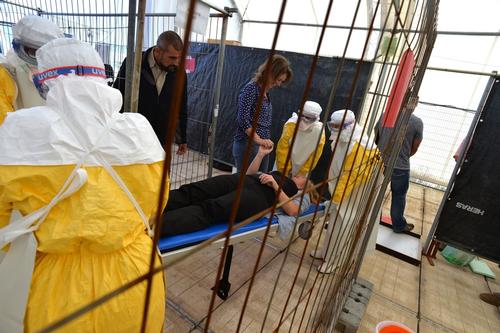Kinshasa – 26 August 2014 - Médecins Sans Frontières (MSF) has launched a response to the confirmed Ebola viral hemorrhagic fever outbreak in Equateur Province, Democratic Republic of Congo (DRC). The medical organization, present in DRC for more than thirty years, is sending doctors, nurses, logistics experts and hygiene specialists to the epicenter of this outbreak.
'Responding fast'
“We received confirmation on Sunday that four of the samples our team took last week have tested positive for Ebola virus,” says Jeroen Beijnberger, MSF Medical Coordinator in DRC. “We are responding fast to try to isolate the suspect and confirmed patients and to start the work of contact tracing.”
Ebola management centre
Working with the Congolese Ministry of Health, MSF is setting up an Ebola management centre in Lokolia, the area most affected by the outbreak in the Boende health zone. “Our key objective for now is to do all we can to stop the outbreak spreading and to protect other people from catching the virus,” says Beijnberger.
'Outbreak an unfortunate coincidence'
No link with the Ebola outbreak in West Africa has been established, although that cannot be categorically discounted. “For now, we consider this outbreak as an unfortunate coincidence,” says Beijnberger. “We are trying to confirm the origin of the outbreak, but at this time nothing points to a direct link with the epidemic in Guinea, Liberia and Sierra Leone.”
Good leadership required
In the first phase of response to a new hemorrhagic fever outbreak, protection of patients and health workers is the top priority. Good coordination is also required to ensure that all levels of leadership - from the highest government levels to the local community leaders and village chiefs – pass accurate and constructive information to the population, that burial teams are organised with proper infection control measures, and that contact tracing and epidemiological monitoring are done swiftly and efficiently to avoid the spread of the outbreak.
'Massive epidemic'
“Usually we would be able to mobilise specialist hemorrhagic fever teams, but we are currently responding to a massive epidemic in West Africa,” says Beijnberger. “This is limiting our capacity to respond to the epidemic in Equateur Province. We need other organisations to step up and joint the efforts to support the Ministry of Health: we will not be able to do this one alone.”



